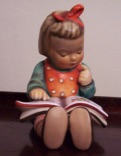Ideas for using
THE SUMMER MY FATHER WAS TEN
in the classroom
A young boy tries to make amends to his neighbor, after he and his friends thoughtlessly destroy the old man's garden. "Growing a garden is fact and metaphor in this profoundly moving cross-generational story with a neighborhood drama that children will relate to and exquisite watercolors that celebrate renewal and connection." Booklist (starred review)
In THE SUMMER MY FATHER WAS TEN, the main story about the father as a young boy, is framed at the beginning and end by the daughter's narration. Do your students think the frame adds to or takes away from the story? Have them discuss their reasons.
Setting is often an important element of a story. Judging from the illustrations, where do your students think the story is set? The author imagined the story taking place in an urban setting such as Brooklyn. The illustrator chose to set it in Portland, Maine, where she had often visited her grandmother when she was a child. Does setting make a difference in a story? Ask your students to tell why they think so.
Names of characters can also be important in a story. Bellavista is made up of two words: bella is Italian for beautiful and vista means view. Is this a good name for this character? Why or why not?
Find the statue in the illustrations of the garden. Can your students identify who this is? St. Francis of Assisi is well-known for his love of all living things. He is often depicted with birds and small animals. He was born and raised in Assisi, Italy in the late 12th century. Why do your students think Mr. Bellavista would have the statue in his garden?
When the boy meets Mr. Bellavista on the stairs and offers to help him with a garden, Mr. Bellavista studies him silently for a few minutes before answering. What do your students suppose Mr. Bellavista was thinking?
Writers often use phrases with three things in them because it gives a sense of completeness. "...we water, mulch and tend it all through the summer", "...he trudged with rake, garden fork and trowel...", "...weeding, watering and watching over his plants" are some examples from this story. Can your students find any others? Can they think of phrases or stories with threes in them? Morning, noon and night; Wynken, Blinken and Nod; small, medium and large; Three Little Kittens, Three Blind Mice, and Three Billy Goats Gruff are some examples. There are lots more.
Discuss with your students: which is more important - to say you're sorry or to prove that you're sorry by your actions, or do you need to do both? How would the story have been different if, after the boy apologized to Mr. Bellavista, he had not been allowed to help make a new garden? How important is it to be forgiven, and how do you know when you have been forgiven?
Readers often ask if a story is true or not. Authors like to distinguish between "is it true?" and "did it really happen?" When Katherine Paterson was asked once if a story was true, she answered, "I hope so. I worked very hard to make it true." Paula Fox once said, "The job of the writer is to imagine the truth." THE SUMMER MY FATHER WAS TEN is not a story passed down to the author from her father. But she worked very hard to make it true, and hopes that it rings true to readers and resonates with the values and beliefs which they hold to be true in their hearts.

